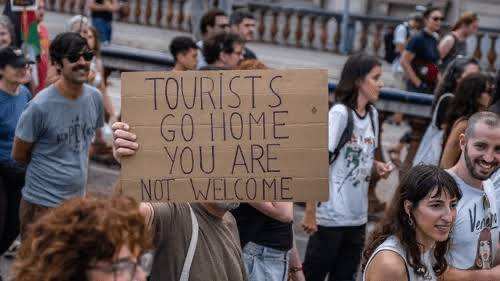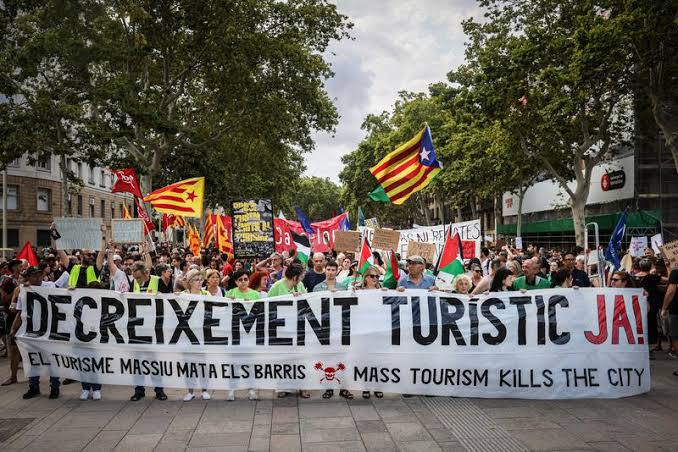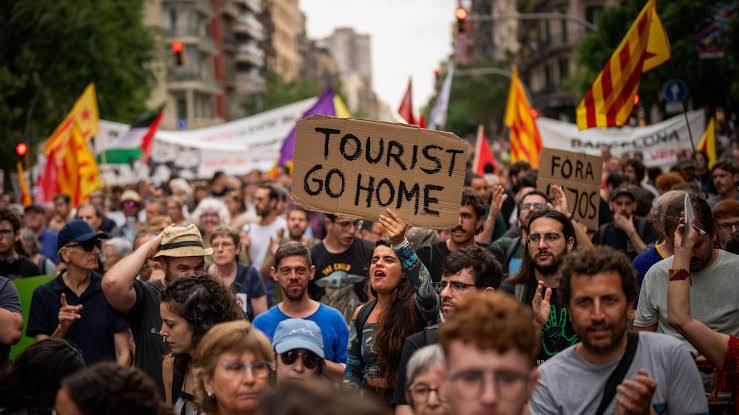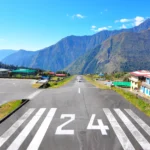Across Southern Europe, from Barcelona to the Canary Islands, a growing movement is sending a clear message: local communities are calling for urgent reform of mass tourism—but they are not attacking tourists individually.

Barcelona: Water Guns, Smoke Bombs & Slogans
On June 15, hundreds of residents in Barcelona mobilized under the banner “Tourism steals our bread, homes, and future.” Armed with water pistols and smoke bombs, protesters symbolically targeted holiday rentals and hostels—spraying tourists and chanting “Tourists go home.” However, organizers emphasized their anger lies with systemic tourism policies, not visitors themselves.
Europe-Wide “Touristification” Backlash
In cities across Spain, Italy, Portugal, and Greece, simultaneous protests targeted overtourism—the over-dependence on tourism, skyrocketing housing prices, and unsustainable development. In Venice and Genoa, protesters carried replica cruise ships down narrow streets; in Lisbon, activists staged a mock eviction of a saint statue to dramatize displacement. Even idyllic Sirmione, Italy, has deployed “street tutors” to curb public nuisance—placing volunteers at pedestrian choke points to guide respectful tourist behavior.
Islands Fight Back Too

On Spain’s Balearic and Canary Islands, protests showcase the conflict between tourism and environmental realities. Islanders blocked roads, launched hunger strikes, and staged mass demonstrations, decrying “tourismphobia” and urging policies like visitor caps, eco-taxes, and limits on hotel construction. In Tenerife, hunger strikers successfully halted a major beachfront hotel project; in Majorca, up to 50,000 locals marched against ever-growing tourist numbers.
The Real Impact on Locals
- Housing crisis: In Barcelona and Mallorca, short-term rentals have pushed rents upward by over 30–70%, displacing residents and transforming communities into de facto “tourist zones.”
- Environmental strain: Services—water, waste, transportation—are overwhelmed. Popular locales like Venice and Hallstatt have enforced entry fees, vehicle limits, or created barriers to soak up excess visitors.
- Cultural erosion: Shops, schools, and public spaces increasingly cater to tourists, diminishing local identity and generating precarious jobs in hospitality.
What Protesters Want
Though locals vow “Tourists go home!” their demands are structural:
- Caps on cruise ship arrivals and flights
- Bans or strict licensing of holiday apartment listings
- Tourist taxes or eco-levies to fund infrastructure
- Protective measures for housing affordability and cultural spaces
- Regulations on hotel builds and short-term rentals in fragile regions
Not Anti-Tourist, But Anti-System
A recurring theme: protesters highlight that tourists themselves aren’t the enemy—they are the visible symptom of an increasingly exploitative tourism industry. Their target is the policy framework and profit model that values visitors over residents.
A Turning Point for Travel
- Cities like Barcelona have announced plans to prohibit Airbnb rentals by 2028.
- Mallorca has restricted cruise arrivals and launched daily tourist fees.
- Abroads, cities such as Venice, Hallstatt, Sirmione, and Porto are tightening entry rules or setting up “tourist quiet zones.”
These developments suggest an emerging model of responsible tourism—one that prioritizes the community and ecosystem over mere visitor numbers.
Final Takeaway
Anti-tourism protests across Europe aren’t a rejection of cultural exchange—they’re pleas for balance and respect. Locals are demanding measures that ensure long-term livability, resilience, and community cohesion. The message is clear: tourism must serve both visitors and residents alike.
References
- Reuters: protest wave across southern Europe
- AP News: coordinated water-pistol protests in Spain
- The Guardian: Southern Europe anti-tourist actions
- Forbes: overtourism backlash across Europe






